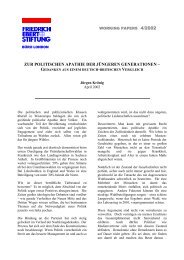Where Now for European Social Democracy? - Policy Network
Where Now for European Social Democracy? - Policy Network
Where Now for European Social Democracy? - Policy Network
You also want an ePaper? Increase the reach of your titles
YUMPU automatically turns print PDFs into web optimized ePapers that Google loves.
ROGER LIDDLE 65particularly in order to sustain elite support <strong>for</strong> the <strong>European</strong> project,does not mean it is ‘bad <strong>for</strong> working families’. Because it is good<strong>for</strong> growth and good <strong>for</strong> jobs, it is good <strong>for</strong> working families too. Wehave no less an authority than the economists of the IMF and theFederal Reserve to underline the point. “Our simulations indicate thatincreasing competition in the euro area to US levels could boost outputby 12.4 per cent in the euro area and 0.8 per cent in the rest of theworld” 10 . As a result, they predict Europe could enjoy an investmentand jobs boom.In the short term, there are inevitable losers from marketintegration. <strong>Social</strong> democrats have an obligation to help these losers toadjust. The traditional social democratic response has been to press<strong>for</strong> increased <strong>European</strong> funding to strengthen ‘social cohesion’ andto argue <strong>for</strong> a social agenda of high regulatory standards in orderto prevent a ‘race to the bottom’. Both these traditional responsesrequire modification.The traditional <strong>European</strong> instruments <strong>for</strong> strengthening cohesionhave been the Structural and Regional Funds. At one time, it waspredicted that the golden triangle at Europe’s core would be the majorbeneficiary of market integration at the expense of the periphery, butthis has proved false. No-one disputes the case <strong>for</strong> transfers to the newmembers of the EU whose living standards are less than half the EUaverage. But within the countries of the EU 15, regional differentialsfollow no consistent pattern and the effectiveness of EU interventionhas varied a great deal. There is a debate to be had on whether thistype of intervention is most appropriately channelled through<strong>European</strong>, national or sub-national budgets – albeit within a common<strong>European</strong> framework. There is also an issue about whether aid shouldbe refocused more on stimulating new sources of growth and helpingindividuals to adjust rather than on specific geographical areas andinfrastructure projects. But, <strong>for</strong> a social democrat, the promotion ofeffective support <strong>for</strong> adjustment must march hand-in-hand withmarket integration.On the issue of regulation, business across Europe is demandingthat the politicians ensure ‘Brussels gets off its back’. <strong>Social</strong> democratsneed to open up a more sophisticated debate about regulation and its



